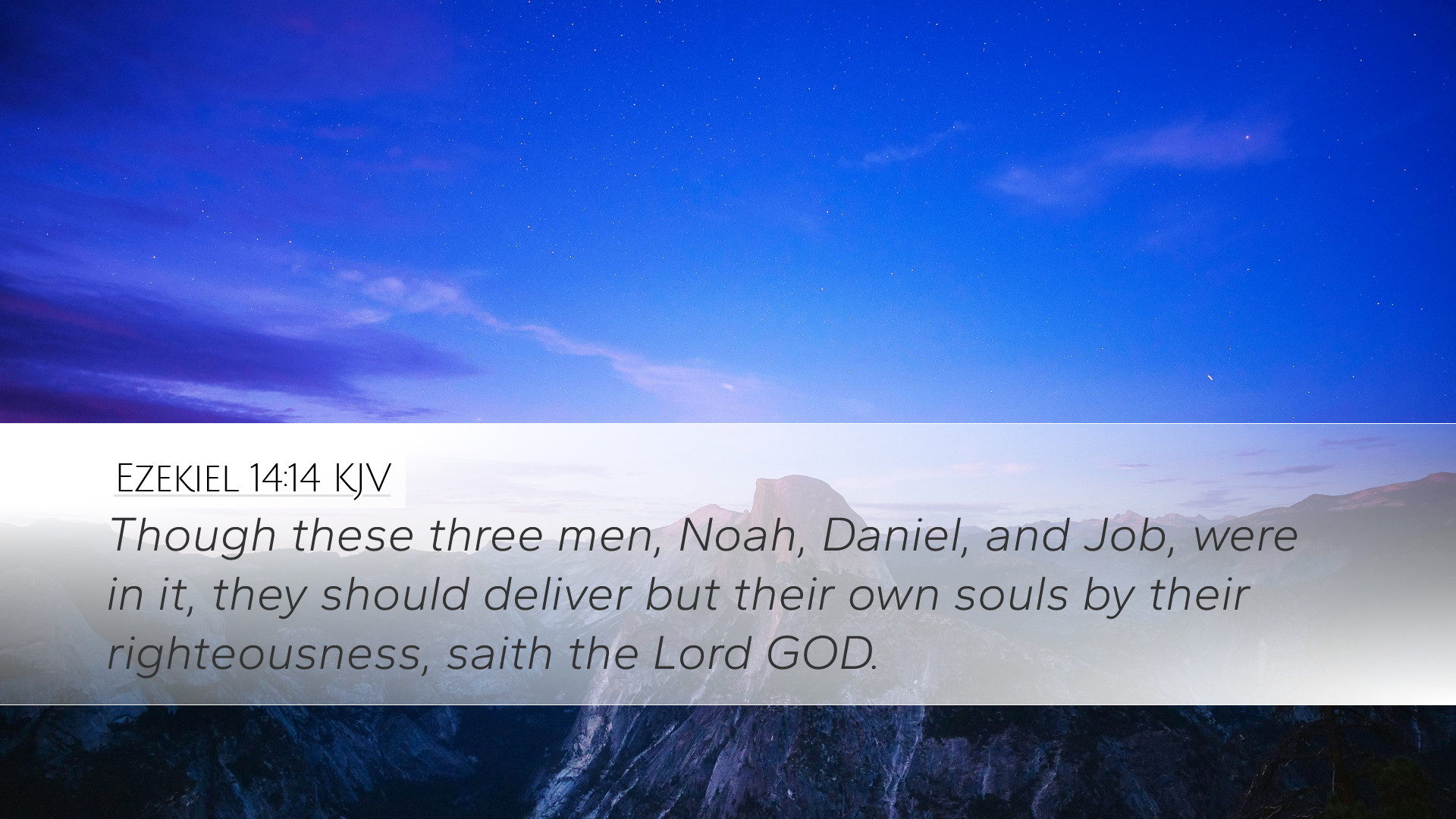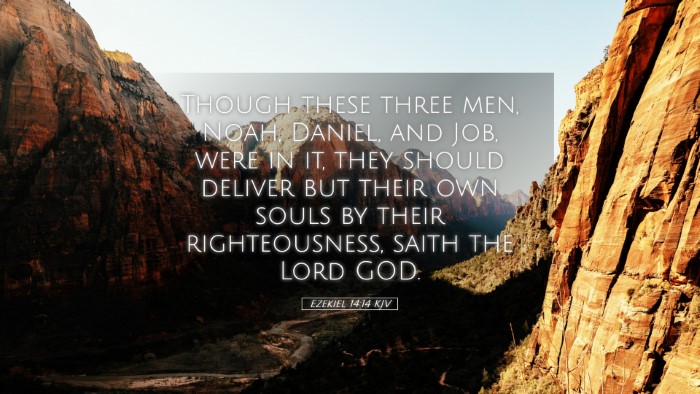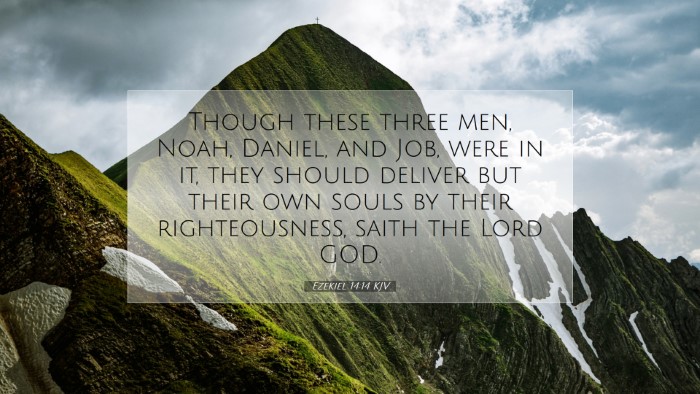Commentary on Ezekiel 14:14
Ezekiel 14:14: "Though these three men, Noah, Daniel, and Job, were in it, they should deliver but their own souls by their righteousness, saith the Lord God."
Introduction
The verse in Ezekiel 14:14 serves as a profound reflection on individual righteousness amid communal judgment. It highlights the futility of relying on the godliness of others for salvation while affirming that personal righteousness is paramount in times of divine judgment.
Contextual Analysis
To fully grasp the implications of this passage, it’s vital to consider the surrounding context in which it is situated. Ezekiel prophesied during a tumultuous period for Israel, where rebellion against God and moral corruption were rampant.
- Historical Context: Israel faced impending judgment from God due to persistent idolatry and disobedience. Ezekiel’s messages often emphasized the consequences of national sin and the lack of sincere repentance.
- Literary Context: This statement comes from a larger discourse in which God is declaring the impossibility of collective salvation based on the righteousness of a few individuals. The presence of Noah, Daniel, and Job, revered as exemplars of righteousness, underscores the gravity of the situation.
Insights from Public Domain Commentaries
Matthew Henry's Commentary
Matthew Henry examines this verse in light of its portrayal of God’s justice. He notes that despite the exemplary righteousness of Noah, Daniel, and Job, their righteousness could not save others:
- Individual Responsibility: Henry emphasizes the biblical truth that each person is responsible for their relationship with God. Righteousness can be personal and cannot extend to save others.
- The Example of Righteous Figures: The mention of Noah, Daniel, and Job serves to illustrate that even profoundly righteous individuals cannot intercede for the unrepentant masses, reinforcing that God’s judgment is impartial and based on individual merit.
- Implications for Israel: Henry notes that this message is particularly poignant for Israel, urging them to recognize that their dependence on heritage or association with righteous figures will not suffice in the face of their collective sin.
Albert Barnes' Notes on the Bible
Albert Barnes provides a detailed exploration of the theological implications behind this verse:
- The Integrity of God’s Justice: Barnes asserts that God’s judgment is always just and equitable. Even the combined righteousness of the three great figures cannot affect the fate of the wicked in Israel, which underscores the principle that God’s justice will not be compromised.
- Intercession and Its Limits: He elaborates on the concept of intercession, suggesting that while these men were upright, their righteousness could not be transferred to others. Each person must stand alone before God.
- Hope for the Righteous: Barnes also points to an underlying message of hope for the individual. Personal piety and righteousness, even if it feels isolated, will bear fruit and be recognized by God.
Adam Clarke's Commentary
Adam Clarke provides further analysis with an emphasis on the characteristics of the individuals mentioned:
- Noah's Faithfulness: Clarke highlights Noah’s unwavering faith amidst a corrupt generation, suggesting that his example serves as a powerful reminder of faithfulness leading to personal salvation.
- Job's Integrity: Clarke points to Job as an exemplar of patience and righteousness, whose story illustrates the profound personal relationship one can maintain with God, regardless of circumstances.
- Daniel’s Righteousness: Daniel’s life of prayer and dedication to God stood out against a backdrop of idolatry, reinforcing the theme that even the most devoted cannot vicariously save others.
- Lesson for Leaders: Clarke observes that leaders and gatekeepers, despite their personal integrity, must not presume to save the people due to their righteous conduct; each individual’s relationship with God is crucial.
Theological Implications
This verse compels us to reflect on several key theological points:
- The Nature of Righteousness: The concept of righteousness is portrayed not simply as moral integrity but as a relationship with God. It is an active pursuit of God’s will and obedience to His commandments.
- Judgment and Mercy: While this passage emphasizes judgment, it does not negate God’s mercy. Individual repentance and seeking God's favor remain themes in the surrounding chapters of Ezekiel.
- Salvation as Personal: Salvation is depicted as a profoundly personal experience. Each individual must seek righteousness themselves, which speaks to the New Testament assertion that salvation comes through faith, not heritage.
Application for Contemporary Faith Communities
This profound message carries weight for pastors, theologians, and students today:
- Call for Personal Righteousness: In an age where communal and societal sin is rampant, believers are reminded to cultivate personal holiness and integrity.
- Awareness of Accountability: Leaders in church communities should lead by example while reminding congregants that responsibility lies with each individual before God.
- Encouragement for the Isolated Righteous: Those who feel alone in their faith should draw strength from these figures, understanding that their righteousness is noted by God even if it does not seem to impact the greater society.
Conclusion
Ezekiel 14:14 serves as a powerful reminder of the importance of personal holiness—an enduring lesson for each generation. The acknowledgment of revered figures such as Noah, Daniel, and Job illustrates both the significance of personal righteousness and the limitations of collective faith. This passage challenges us to evaluate our standing before God, recognizing our individual paths toward righteousness while reflecting on the societal dynamics around us. It is a clarion call for self-examination, encouraging believers to engage in a faith that is active, vibrant, and personal.


